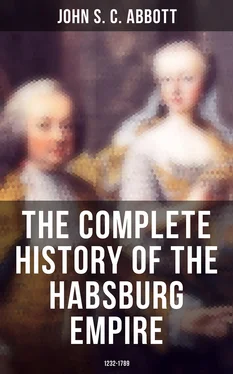The neighboring barons, alarmed at this rapid aggrandizement of Rhodolph, formed an alliance to crush him. The mountaineers heard his bugle call, and rushed to his aid. Zurich opened her gates, and her marshaled troops hastened to his banner. From Hapsburg, and Rheinfelden, and Suabia, and Brisgau, and we know not how many other of the territorial possessions of the count, the vassals rushed to the aid of their lord. They met in one of the valleys of Zurich. The battle was short, and the confederated barons were put to utter flight. Some took refuge in the strong castle of Balder, upon a rocky cliff washed by the Albis. Rhodolph selected thirty horsemen and thirty footmen.
"Will you follow me," said he, "in an enterprise where the honor will be equal to the peril?"
A universal shout of assent was the response. Concealing the footmen in a thicket, he, at the head of thirty horsemen, rode boldly to the gates of the castle, bidding defiance, with all the utterances and gesticulations of contempt, to the whole garrison. Those on the ramparts, stung by the insult, rushed out to chastise so impudent a challenge. The footmen rose from their ambush, and assailants and assailed rushed pell mell in at the open gates of the castle. The garrison were cut down or taken captive, and the fortress demolished. Another party had fled to the castle of Uttleberg. By an ingenious stratagem, this castle was also taken. Success succeeded success with such rapidity, that the confederate barons, struck with consternation, exclaimed,
"All opposition is fruitless. Rhodolph of Hapsburg is invincible."
They consequently dissolved the alliance, and sought peace on terms which vastly augmented the power of the conqueror.
Basle now incurred the displeasure of Rhodolph. He led his armies to the gates of the city, and extorted satisfaction. The Bishop of Basle, a haughty prelate of great military power, and who could summon many barons to his aid, ventured to make arrogant demands of this warrior flushed with victory. The palace and vast possessions of the bishop were upon the other side of the unbridged Rhine, and the bishop imagined that he could easily prevent the passage of the river. But Rhodolph speedily constructed a bridge of boats, put to flight the troops which opposed his passage, drove the peasants of the bishop everywhere before him, and burned their cottages and their fields of grain. The bishop, appalled, sued for a truce, that they might negotiate terms of peace. Rhodolph consented, and encamped his followers.
He was asleep in his tent, when a messenger entered at midnight, awoke him, and informed him that he was elected Emperor of Germany. The previous emperor, Richard, had died two years before, and after an interregnum of two years of almost unparalleled anarchy, the electors had just met, and, almost to their own surprise, through the fluctuations and combinations of political intrigue, had chosen Rhodolph of Hapsburg as his successor. Rhodolph himself was so much astonished at the announcement, that for some time he could not be persuaded that the intelligence was correct.
To wage war against the Emperor of Germany, who could lead almost countless thousands into the field, was a very different affair from measuring strength with the comparatively feeble Count of Hapsburg. The news of his election flew rapidly. Basle threw open her gates, and the citizens, with illuminations, shouts, and the ringing of bells, greeted the new emperor. The bishop was so chagrined at the elevation of his foe, that he smote his forehead, and, looking to heaven, profanely said,
"Great God, take care of your throne, or Rhodolph of Hapsburg will take it from you!"
Rhodolph was now fifty-five years of age. Alphonso, King of Castile, and Ottocar, King of Bohemia, had both been candidates for the imperial crown. Exasperated by the unexpected election of Rhodolph, they both refused to acknowledge his election, and sent ambassadors with rich presents to the pope to win him also to their side. Rhodolph, justly appreciating the power of the pope, sent him a letter couched in those terms which would be most palatable to the pontiff.
"Turning all my thoughts to Him," he wrote, "under whose authority we live, and placing all my expectations on you alone, I fall down before the feet of your Holiness, beseeching you, with the most earnest supplication, to favor me with your accustomed kindness in my present undertaking; and that you will deign, by your mediation with the Most High, to support my cause. That I may be enabled to perform what is most acceptable to God and to His holy Church, may it graciously please your Holiness to crown me with the imperial diadem; for I trust I am both able and willing to undertake and accomplish whatever you and the holy Church shall think proper to impose upon me."
Gregory X. was a humane and sagacious man, influenced by a profound zeal for the peace of Europe and the propagation of the Christian faith. Gregory received the ambassadors of Rhodolph graciously, extorted from them whatever concessions he desired on the part of the emperor, and pledged his support.
Ottocar, King of Bohemia, still remained firm, and even malignant, in his hostility, utterly refusing to recognize the emperor, or to perform any of those acts of fealty which were his due. He declared the electoral diet to have been illegally convened, and the election to have been the result of fraud, and that a man who had been excommunicated for burning a convent, was totally unfit to wear the imperial crown. The diet met at Augsburg, and irritated by the contumacy of Ottocar, sent a command to him to recognize the authority of the emperor, pronouncing upon him the ban of the empire should he refuse. Ottocar dismissed the ambassadors with defiance and contempt from his palace at Prague, saying,
"Tell Rhodolph that he may rule over the territories of the empire, but he shall have no dominion over mine. It is a disgrace to Germany, that a petty count of Hapsburg should have been preferred to so many powerful sovereigns."
War, and a fearful one, was now inevitable. Ottocar was a veteran soldier, a man of great intrepidity and energy, and his pride was thoroughly roused. By a long series of aggressions he had become the most powerful prince in Europe, and he could lead the most powerful armies into the field. His dominions extended from the confines of Bavaria to Raab in Hungary, and from the Adriatic to the shores of the Baltic. The hereditary domains of the Count of Hapsburg were comparatively insignificant, and were remotely situated at the foot of the Alps, spreading through the defiles of Alsace and Suabia. As emperor, Rhodolph could call the armies of the Germanic princes into the field; but these princes moved reluctantly, unless roused by some question of great moment to them all. And when these heterogeneous troops of the empire were assembled, there was but a slender bond of union between them.
But Rhodolph possessed mental resources equal to the emergence. As cautious as he was bold, as sagacious in council as he was impetuous in action, he calmly, and with great foresight and deliberation, prepared for the strife. To a monarch in such a time of need, a family of brave sons and beautiful daughters, is an inestimable blessing. Rhodolph secured the Duke of Sclavonia by making him the happy husband of one of his daughters. His son Albert married Elizabeth, daughter of the Count of Tyrol, and thus that powerful and noble family was secured. Henry of Bavaria he intimidated, and by force of arms compelled him to lead his troops to the standard of the emperor; and then, to secure his fidelity, gave his daughter Hedwige to Henry's son Otho, in marriage, promising to his daughter as a dowry a portion of Austria, which was then a feeble duchy upon the Danube, but little larger than the State of Massachusetts.
Ottocar was but little aware of the tremendous energies of the foe he had aroused. Regarding Rhodolph almost with contempt, he had by no means made the arrangements which his peril demanded, and was in consternation when he heard that Rhodolph, in alliance with Henry of Bavaria, had already entered Austria, taken possession of several fortresses, and, at the head of a force of a thousand horsemen, was carrying all before him, and was triumphantly marching upon Vienna. Rhodolph had so admirably matured his plans, that his advance seemed rather a festive journey than a contested conquest. With the utmost haste Ottocar urged his troops down through the defiles of the Bohemian mountains, hoping to save the capital. But Rhodolph was at Vienna before him, where he was joined by others of his allies, who were to meet him at that rendezvous. Vienna, the capital, was a fortress of great strength. Upon this frontier post Charlemagne had established a strong body of troops under a commander who was called a margrave; and for some centuries this city, commanding the Danube, had been deemed one of the strongest defenses of the empire against Mohammedan invasion. Vienna, unable to resist, capitulated. The army of Ottocar had been so driven in their long and difficult march, that, exhausted and perishing for want of provisions, they began to mutiny. The pope had excommunicated Ottocar, and the terrors of the curse of the pope, were driving captains and nobles from his service. The proud spirit of Ottocar, after a terrible struggle, was utterly crushed, and he humbly sued for peace. The terms were hard for a haughty spirit to bear. The conquered king was compelled to renounce all claim to Austria and several other adjoining provinces, Styria, Carinthia, Carniola and Windischmark; to take the oath of allegiance to the emperor, and publicly to do him homage as his vassal lord. To cement this compulsory friendship, Rhodolph, who was rich in daughters, having six to proffer as bribes, gave one, with an abundant dowry in silver, to a son of Ottocar.
Читать дальше












